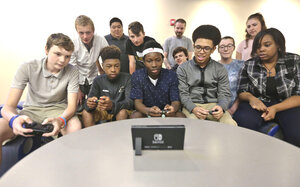When schools tap a love of esports
To reduce high absenteeism, many middle schools set up clubs for gamers, helping them to find belonging built on a shared passion that’s also a new avenue for learning.

Students at Eisenhower High School in Decatur, Ill., play a game as part of an esport team in 2018.
AP
Always eager to reach young people with the values of athletic sports – excellence, respect, and friendship – the International Olympic Committee announced last week that the first video gaming Olympics will take place next year. It was one more example of how multiplayer electronic sports, or esports, have become not only universal among teens but also a powerful tool to enhance the education of gaming enthusiasts. A few lesser-known examples show just how powerful.
In the United States, esports clubs are being introduced in middle schools to help deal with a near doubling in student absenteeism since the pandemic. The clubs, which are often integrated into classrooms, have proved to be a big enticement for kids to go to school. The teacher-guided esports increase a sense of belonging and a deeper engagement with others. They also help students build a variety of skills such as teamwork and critical thinking.
At three middle schools in Virginia’s Henrico County, esports clubs “are proving to be a game-changer in boosting attendance and reversing the student engagement slide that follows elementary school,” reported Education Week. “At two of the schools, no student who was part of the esports club was considered chronically absent – even though kids were encouraged to join based in part on their spotty attendance records.”
Not all of the students in a club play video games. Some learn to shout-cast, or comment on a game in real time. Others set up the electronics or learn about sports management. In Henrico County, the schools use games that are nonviolent – as the Olympic Esports Games will be.
For students in these clubs, “Your grades are going to be better. Your behavior is going to be better. Your sense of well-being is gonna be better,” Jon Gregori, an education innovation specialist in Virginia, told Education Week.
Schools have long tried to fix the root causes of absenteeism, such as student bullying or unsupportive parents. Yet with about 85% of American teens playing video games, one easy solution is to use a popular activity as an avenue for deep connection and learning. “They show up, and then you have the opportunity to teach them all different things,” Claire LaBeaux, chief advancement officer for the Network of Academic and Scholastic Esports Federations, told the publication Government Technology.
Esports clubs are simply using what teens love to do to broaden their experience of connection with others in a classroom. For many, that’s an incentive to get up each morning and head to school.

